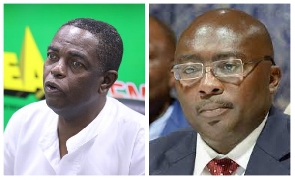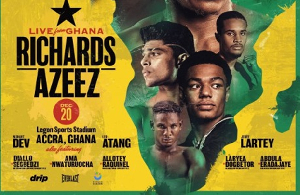Managing Editor of Insight Newspaper, Kwesi Pratt Jnr, has criticized the campaign team of Vice President Dr. Mahamadu Bawumia, particularly targeting Osei Kyei-Mensah-Bonsu, the Majority Leader of Parliament.
Pratt's critique follows a letter written by Osei Kyei-Mensah-Bonsu in response to accusations of him engaging in tribal politics as alleged by Kennedy Agyapong, a Member of Parliament and New Patriotic Party (NPP) flagbearer hopeful.
Bonsu had defended Dr. Bawumia's campaign, stating that the vice president does not engage in tribal politics but he is focused and has never attacked fellow contestants on his campaign tours, a claim that Pratt disputes.
Speaking on a panel discussion on Peace FM’s Kokrokoo, Kwesi Pratt argued that Vice President Bawumia is, in fact, a beneficiary of what he termed "dirty, nasty politics."
"Kennedy, I know that many people are not pleased with how he talks because sometimes he says anything he feels like.
“They have the right not to like him, but it doesn't mean that whatever he says, whether it's out of context or not, is unimportant. This morning, in the Daily Guide, page 3, the Majority Leader denied accusations of tribal campaigning,” he said.
He noted that Bawumia had previously urged former President John Mahama to convert to Islam if he wanted to garner the support of the Muslim community.
Additionally, Pratt pointed to a public statement made by the vice president in the run-up to the 2016 elections, in which Bawumia advocated for a Muslim representative in the Jubilee House who could speak on behalf of the Muslim population.
“I would be surprised if all of us here in the studio, including Opanyin Agyekum, hadn't seen the video where Bawumia went to the Chief Imam's place and said that he is a Muslim and suggested that if Mahama wanted Muslims to vote for him, he should revert to Islam.
“He said that if Mahama wanted to be identified as a Muslim, he should revert to Islam, in his own words. Additionally, there's the campaign message where they say it's time for Northerners; is this not a form of tribal, regional, and ethnic politics?” he added.
Pratt emphasized the need to eradicate tribalism and religious campaigning from Ghana's political landscape, characterizing it as detrimental and divisive.
“So, regarding these kinds of campaigns, if Kennedy Agyapong responds to such campaign messages, is he the one who is a tribalist? What is this? We have to move away from tribalism and religious-based campaigns because they have become a part of our political landscape.
“Wherever you go, you encounter such things. It's not a good practice, and it's very dirty and nasty and Bawumia has benefited from this kind of dirty and nasty tribal-religious campaigns.
“Have you also forgotten the video from 2016 when Bawumia said we need to have a Muslim in the Jubilee House who will speak for the Muslims? Didn't you also hear about that one?
“...So, we should strive to be fair because as I read through most of the dailies, others are criticizing Kennedy Agyapong for engaging in tribal politics."
AM/SARA
Click here to start the nomination process for the 2023 GhanaWeb Excellence Awards
Ghana’s leading digital news platform, GhanaWeb, in conjunction with the Korle-Bu Teaching Hospital, is embarking on an aggressive campaign which is geared towards ensuring that parliament passes comprehensive legislation to guide organ harvesting, organ donation, and organ transplantation in the country.
You can also watch this episode of People & Places here:
Politics of Saturday, 14 October 2023
Source: www.ghanaweb.com













